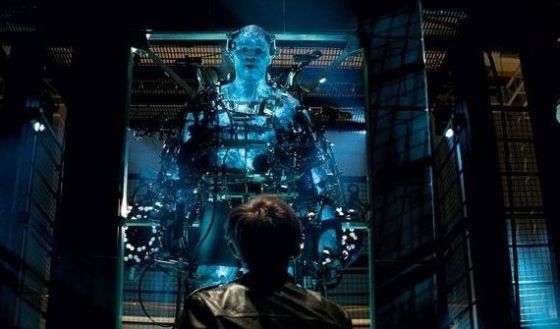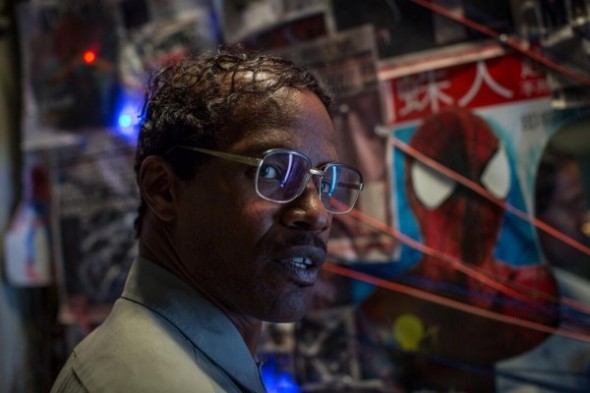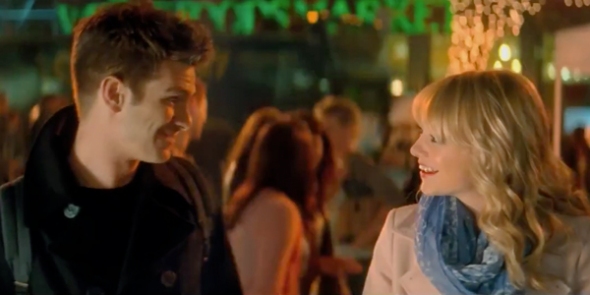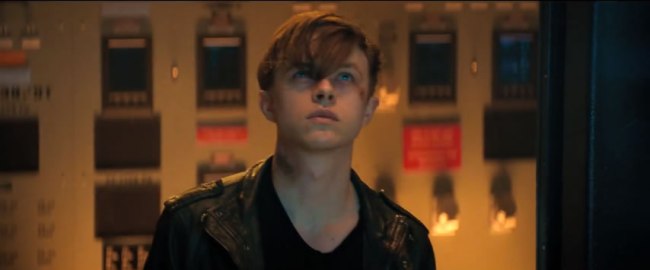So, a little bit of context before I get into discussing this film, my personal history with Spider-Man. Socially introverted and awkward as my early teens were, I was never hugely into comic books, but the little I did invest in them was the direct result of my seeing the first ‘Spider-Man’ film back in 2002, directed by Sam Raimi. I barely knew anything about the guy, his powers, his story, the villains, the love interests, anything, but watching Tobey Maguire as Peter Parker taking on Willem Dafoe’s Green Goblin was the coolest thing I’d seen at the time since Darth Maul v. Obi-Wan and Qui Gon in ‘The Phantom Menace’, and so that was my gateway to superhero stories. I still didn’t become a huge comic book reader, but when I did pick up an issue it was always Spidey, and being 11 or 12 at the time naturally I made an attempt at my own comic book. And that is the first and last time I will ever make mention of that little endeavour. And when ‘Spider-Man 2’ came out, yeah that was fun too, although I still missed Goblin as the villain, but you can imagine how much I fanboyed from that little teaser at the end where Harry Osborn finds his father’s lair. Goblin’s coming back! So much for me to look forward to, massive personal hype!
And then we got ‘Spider-Man 3’…my god. What the hell happened? Sandman? Completely doing over the whole Uncle Ben’s killer thing?! VENOM ONLY SHOWING UP AT THE END?! Oh yeah, and Harry is only Goblin in like one scene before losing his WHOLE memory and turning good in the end! ‘Spider-Man 3’, my first experience of great cinema betrayal. Everything I’d been anxiously awaiting for three years, just done so wrong. Too many villains, all done poorly, a completely bland love triangle thrown in for no reason, those astonishingly awful ‘emo-Peter’ dance scenes…you get it, I didn’t like that film.
Then after just five years, Spidey gets a reboot in 2012 with ‘The Amazing Spider-Man’. Whole new start, whole new cast, storyline, everything. Andrew Garfield donned the red-and-blue mesh mask, Mary Jane was out and Emma Stone’s Gwen Stacey was in, and the result was ok. Rhys Ifans’ reptilian foe for the new webslinger’s debut was just about decent enough, even if it did copy a few elements from Dafoe’s original Goblin (yes that’s the standard by which I hold all supervillains, him or The Joker). The rest of the film, I guess it was more faithful to the comics than the other trilogy and Garfield was a very good webhead. Wise-cracking, way more gymnastic, not quite as much the ‘nerd’ as Maguire though so I never took his whole heartthrob problems that seriously. Honestly, his Peter Parker I found to be kinda a dick! Seriously, you’re gonna end the film with Parker WILLINGLY BREAKING A PROMISE HE MADE TO A DYING MAN?! I don’t care if he had just saved the city from a Nazi-KKK alliance trying to set off an atomic bomb, IF YOU DO THAT THEN YOU ARE NOT SOMEONE FOR KIDS TO LOOK UP TO! Wow actually looking back on it I have a few Spidey-related rants, sorry!
Which brings us to today, and Garfield and co.’s second outing in what is apparently set to become the ‘Spidey Cinematic Universe’ (watch out MCU…). Three villains again (because that worked so well last time…), more exploring Peter and Gwen’s relationship, really the best part about the first film given the chemistry of our two leads and the fact these films have been helmed by ‘500 Days of Summer’ director Marc Webb, and to its credit an intriguing broader mystery concerning Peter’s parents and the sinister goings on at Oscorp. This is ‘The Amazing Spider-Man 2’.
For Spider-Man, life is good. New York City loves him, and his heroics are rewarded with every swing. For Peter Parker, life is complicated, juggling his personal life as a high school student with his secret vigilante responsibilities, and when it comes to Gwen Stacey his balancing becomes especially precarious. Questions about his parents remain unanswered, in particular the work his father was doing for Oscorp Industries, but in his pursuit of the truth Peter finds both himself and the city bombarded with devastating new threats. Max Dillon (Jamie Foxx), an electrical engineer, is reborn as the dangerously insane Electro, Alexsei ‘The Rhino’ Sytsevich (Paul Giamatti) tears up the streets, and the return of Peter’s childhood friend Harry Osborn (Dane Dehaan) all point to one unifying fact; Oscorp has big plans, for itself, for the city, and for Spider-Man.
Before I delve into any substantive commentary on the film itself, I need to get one thing off my chest and on the page before anything else; Sony, you cheeky, slippery, calculating fiend. If you’re going to base your entire marketing strategy around three villains…you need THREE VILLAINS. I’m not even going to dance around this point with clever language, I’m just going to say this upfront. The Rhino is not an antagonist in this film. He just isn’t, unless you stretch the definition to apply to anyone and everyone who so much as throws a spanner at Spidey as he swings by. Being an antagonist means you pose an actual threat to the protagonist. It means you present the ‘hero’ with some sort of problem or conflict that actually tests them, that probes their limitations and forces them to undergo some kind of journey that will enable them to ultimately triumph. About five minutes of screen time to kick the film off in the beginning, and what can’t have been more than a three minute encore at the end, and he doesn’t even get the big bad suit of destruction until the latter. Rhino is not an antagonist in this film, so GET HIM OFF THOSE PROMOTIONAL POSTERS you wily band of attention-seeking coyotes. Don’t get me wrong, I know Rhino is basically just a thug, and Paul Giamatti clearly has fun in the part, but he literally contributes nothing more to the story than would a bunch of falling debris. You may read this and bemoan me for spoilers and whatnot, but once you see this film you really won’t think I’ve spoiled anything. You can’t spoil something that doesn’t really add anything anyway. Sorry I just hate it when film marketing like that basically lies.
“Not everyone gets a happy ending”
‘When Enemies Unite’. That’s been the main tagline of this film, and like I said the promotional material has really stressed the gallery of rogues on show this time around, getting more attention than Spider-Man himself! The webslinger’s list of formidable foes has always been perhaps the lengthiest of any superhero, even for a comic book character, and what with Marvel monopolizing the genre with generally protagonist-centric productions, it’s a commendable decision on Sony’s part to try and give their own cinematic universe a distinctively antagonist-orientated identity. With plans for further expansions in the franchise set to include spinoffs featuring fan-favourite Venom and The Sinister Six (think The Avengers, but evil, and all just wanting to kill Spidey), how this will fare against the well-established Marvel juggernaut should be an interesting clash whatever the outcome, and if Sony’s treatment of villains in ‘The Amazing Spider-Man 2’ is any sign of what to expect in the future then we’ve got some excellent baddies in store.
What makes a truly great villain? Is it just how they look, their abilities, their weapons and tech? Is it their backstories, or lack thereof? What’s the secret to why we love the Joker so much, or Loki, or Darth Vader? It’s the extent to which their very existence forces us to look at the hero in a different way, how far they are able to raise new questions and challenges for the hero to answer and overcome however they can. What is the Joker’s ultimate appeal, if not the fact that he is the absolute inversion of Batman, and presents the Dark Knight with an ominous look at what could happen if he were to ever stray from his thin moral code? If Anakin Skywalker was meant to be the Chosen One once, how can Luke truly believe that the same potential for evil isn’t within him too like a genetic disease? This is what makes a great villain, and by far this film’s greatest strength is its handling of just these issues. Oscorp is the unifying factor for Spider-Man’s enemies on the surface, but underneath it all they are connected by something far more meaningful; the question of what happens when Spider-Man cannot be the hero. Electro starts out as hopeless and hapless nobody Max Dillon, resentfully accepting of his invisibility to the world before Spider-Man one day saves his life, only to then lose himself again in a desperate obsession with the webslinger that will only lead to bitter disappointment…a disappointment that levels Times Square. He cannot be saved from himself, and that’s something Spider-Man doesn’t know how to handle. The return of Peter’s childhood friend Harry Osborn further highlights the power Spider-Man must be responsible for, and when Harry beseeches him for help he knows he can’t give as either Peter Parker or Spider-Man, his impotency births yet another demon bent on plaguing him. Not since we first saw Uncle Ben die in Raimi’s 2002 original has the distinctive mantra of ‘with great power, comes great responsibility’ been so keenly felt and appreciated. This film takes that old renowned gospel truth in Spidey lore and gives it a fresh layer of colouring, with Spider-Man realizing his responsibilities aren’t necessarily limited to his own power, but applicable to the power of his foes.
“You’re Spider-Man, and I love that. But I love Peter Parker more”
As stated, by far the best part of the first film was the relationship between Peter Parker and Gwen Stacey, and the romance and emotional core of the film they provide is definitely kicked into a solidly satisfying second round of ‘it’s complicated’ drama. If ‘joint performance in a superhero film’ were a fair measurement for celebrity relationships then it would be safe to say that Andrew Garfield and Emma Stone are still keeping the sparks flying thick and fast between them off the set, their in-character chemistry even better than before and making for many of the film’s emotionally weightier scenes. What the Raimi trilogy achieved through constantly hammering in Peter Parker’s angst and sorrow with scenes of Maguire crying or lingering shots of his puppy-dog eyes in the middle of a street, this film covers with a simple, subtle but no less effective shot of Peter’s bedroom ‘wall of conspiracy’ including a post-it note with the words ‘do I have to lose you too?’ beneath a picture of him and Gwen together. Tiny moments, precious instances, that’s all it takes to communicate what the stakes are for Peter at the end of the day. Balancing his ordinary life with his vigilante one is more than simply a question of time allocation. His decisions have consequences, and the powerlessness he is forced to confront by his enemies makes it that much more serious that he retain what power he can over his own affairs.
Also as stated, by far the worst part of the first film was Peter’s ultimately total abandonment of the promise he made Gwen’s dying father, swearing he would protect her by distancing himself from her only to then sit directly behind her in class and mutter that promises you can’t keep ‘are the best kind’. Perhaps director Webb and writers Roberto Orci and Alex Kurtzman went online at some point in the last two years and saw for themselves the general grumblings over that little mishap, because it’s fair to say that amends are made this time around what with Peter finding himself routinely haunted by ghostly visions of Captain George Stacey’s cold disapproval, visions that play havoc with his guilt and actually draw upon last film’s closing blunder as a source of internal conflict. Peter loves Gwen absolutely, but does he love her enough to give her the protection she truly needs? Does he love her enough to force her away? Ultimately, these are the questions that he must answer in grappling with both sides of his life, a choice between being the hero and keeping her safe, or being ordinary Peter Parker and selfishly keeping her loved. So far as the Peter-Gwen relationship goes, this film is the stuff the established Spidey fans have dreamed of, and packs a good amount of laughs and warmth to put a smile on any average cinemagoer’s face.
“We have plans for you”
Just what is Sony’s game plan? Outside of the aforementioned super villain team-up spinoff somewhere down the line, it’s still rather difficult to say. I don’t need to go on again about how much of a game changer the Marvel Cinematic Universe is to the genre and the wider industry, and it’s pretty safe to say that they are far enough ahead of the game that they don’t need to seriously worry about contenders for a good while. That being said, Sony certainly has the makings of a cinematic universe potentially as compelling and colourful, with a wealth of exciting villains to throw at Spidey, as well as more domestic dramas and relationship problems and possibilities than a combined episode of ‘Desperate Housewives’, ‘Made in Chelsea’ and ‘Eastenders’, yet two films down now it’s still hard to get a sense of much clear and confident direction with regards to the ‘bigger picture’. Film 1 kicked things off with opening up questions about the nature of Peter Parker’s parents and their disappearance, a subplot that may have tailed off into little more than an uninformative post-credits scene between then-antagonist Dr. Curt Connors and the mysterious ‘man in the hat’, but returns with a vengeance now. Really, so far as the mysteries of film 1 go, film 2 seems to polish them all of very satisfyingly, which therefore begs the question of ‘what next?’ A frankly genius twist to the ‘secret origin’ of Spider-Man really wraps up the conspiracy elements of both films perfectly, as well as lays the foundations for the rise of webhead’s greatest enemy, but what are the implications for the franchise going forward? There is certainly a distinct sense that everything we see in each of these films is merely part of the whole, but whereas instalments in the MCU tend to feel like carefully-crafted and securely structured chapters in a grand novella, these films have more the vibe of building blocks in a Jenga tower. They’re definitely going for something bigger and better, but at times it seems as if their focus is so determinedly on that end goal that they forget to reinforce their own infrastructure as they go. This doesn’t detract from the film’s entertainment value for both the casual viewer and dedicated fans, but it does deprive us of an assuring sense of there being a thought-out purpose at work. You’ll leave the cinema going ‘that was a great film’, not ‘that was a great film, I can’t wait to see what happens next!’
“I like to think Spider-Man gives people hope”
Andrew Garfield is Spider-Man. There is absolutely no questioning that anymore. He has the physique, wiry yet sturdy, he has the voice, he has exactly the right sense of humour and comic-timing. Few other comic characters have been brought to life so exactly, so definitively. Garfield’s got the angst, he’s got the earnestness, he’s got the depth. He just is Spider-Man, and you are sure to come away from this film convinced at least of that much, especially with the redesigned costume that at last gives the feeling that Spidey has actually leapt out of the comic book pages and into the screen. Andrew Garfield is not so much Peter Parker, in that the film does little to get across such sides to his character as the fact that he’s a whizz kid and socially awkward, instead making Emma Stone’s Gwen Stacey the real brains to his brawn and re-characterizing him as being distinctly more adept in the fields of social interaction and romance. That aside, Garfield’s performance certainly proves that he’s upped his game, making particularly potent moments throughout the film pack that extra emotional punch to the audience’s gut, and providing the perfect face for Spider-Man at a time when what he can’t do is more the focus than what he can do.
Peter: “I didn’t get a love vibe last night, I got more of a ‘want to kill me’ vibe”
Gwen: “That’s kinda what it’s like to love you”
Emma Stone’s performance as the headstrong, brainy, ballsy love of Peter’s life was easily the best thing about film 1, and she returns here every bit the definitive Gwen Stacey. Absolutely nailing the struggle of her own character in addition to Peter’s, because of Peter’s, having to deal with his guilt and the prospect of her ambitions and dreams coming into conflict with what she knows makes her happy in the here and now, Stone makes sure we understand that anyone would be beyond lucky to have a woman like her Gwen. In a film so steeped in the idea of responsibility, it is she who effectively embodies the idea of consequence, though that doesn’t mean she simply surrenders her fate to the actions of others. The superhero genre, indeed the film industry in general, would be doing extremely well if it had more characters like Gwen, and performances like Emma Stone’s.
“I just wanted everybody to see me…”
If his Django wasn’t a raw, chilling, electric enough performance for you, Jamie Foxx goes all out as the film’s centrepiece psychopath, Electro. Exactly what sends the formerly mild-mannered and timid Max Dillon over the edge following his accidental transformation in an Oscorp electric eels tank has been the subject of some debate amongst fans and internet commenters, with some trailers hinting at it being the result of Spider-Man forgetting his name, others more suggestive of his being shot at by police snipers. In the end, the tipping point is actually far simpler, and has a much greater impact on our understanding of him as a character. Simply put, he loses his spotlight. His skin aglow, electricity spurting from his limbs, he looks around and sees that every screen in Times Square shows his face, the first time in his life that he feels like he truly exists to other people. Then Spider-Man arrives on the scene, and he feels plunged back into obscurity as all the attention shifts to the webslinger. Jealousy is no longer the green-eyed monster, but the blue-skinned being. “You’re selfish…” Max snarls at the hero he had convinced himself until earlier that day was a true friend. To everyone else in the scene, it’s the tiniest possible trigger. To us, having seen who Max is and where he comes from, we cannot help but empathize even as he begins to take his revenge. The filmmakers and VFX artists clearly relished in their work on bringing his power to life, from the borderline horrific imagery of Max’s accident and aftermath to the use of his abilities, to his final costume. Max spent his life being ignored and forgotten, but you will remember Electro before he is through. Foxx makes sure of that, as well as never letting his demonic side stray too far from the desire that fuels it all at his core; the desire to be wanted, to be needed. He also has by far the best theme music, keep an ear out for those chilling distorted whispers representing the voices in Max’s head.
“We, literally, can change the world”
As much as Foxx’s Electro may take centre stage for most of the film, Dane Dehaan’s gradual slide into desperation and insanity as Harry Osborn is the true source of menace in this film, and clear indication that his casting was based on his performance in 2012 ‘found footage’ super power feature ‘Chronicle’. Assuming control of Oscorp following the death of his father Norman, a cameo appearance from a sickly-green and sharp-nailed Chris Cooper, Dehaan’s Harry gradually finds himself starting down a very dark path as the result of torments from both within and without, torments that drive him further and further towards dangerous, psychopathic desperation in the form of an alliance with a semi-incapacitated Electro, and his own final acquisition of a prototype military suit and glider which provides another scene of startlingly disturbing imagery and visuals. We must not look at goblin men…
So how does this stack up in the annals of Spider-Man cinematic history? Raimi’s ‘Spider-Man 2’ seems to be the general standard of excellence so far as this goes, what with it’s comprehensive look at Peter Parker’s struggles both as Spidey and in normal life, and the fantastic foe that was Doc Ock. This being also the second outing of such a franchise, can the same be said now? Not quite, but it’s not far off. The action and set pieces do exactly what they should in a sequel, offering us bigger and better moments and visuals to feast our eyes and ears on, the solemn duty of any self-respecting blockbuster. The acting talent all round can only be described as a marked improvement on something that was already at least pretty solid, and characters left right and centre are a joy to watch both individually and in their interactions with each other, their paths interweaving in such a fashion that generally the feel is quite organic. Perhaps the best thing of all about this film though? It shows that when it comes to telling a Spider-Man story, it can still throw a few surprises your way, be they pleasant or simply inspired.
Quality: 3/5
Entertainment: 4/5
Averaged Out: 4/5
Patchman















